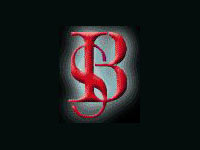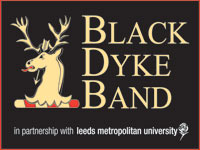Epic Brass II
11-Jun-2008Black Dyke & International Staff Band
Conductors: Dr Nicholas Childs & Dr Stephen Cobb
The Sage
Saturday 17th May
With great sense of anticipation, a sell out crowd for the long awaited Epic Brass II concert gathered at The Sage, Gateshead.
The concert goers mingled freely with members of both the participating bands, and as people chatted freely with friends perhaps not seen for a long time, there was an expectant atmosphere prevalent in the build up to what was surely going to be a memorable occasion.
Thrilled
 The organisers must have been thrilled to see the venue full to capacity and World of Brass are to be congratulated for having the vision to stage the event in such a magnificent setting.
The organisers must have been thrilled to see the venue full to capacity and World of Brass are to be congratulated for having the vision to stage the event in such a magnificent setting.
The anticipation was prolonged, with a slightly delayed start to the proceedings, but both the entry and the opening piece by the International Staff Band was worth waiting for.
Major Leslie Condon’s “The Call of the Righteous” got the evening off to a start that will have thrilled everyone and not just the many Salvationists that were present. Those visiting The Sage for the first time soon realised the superb acoustic of the building, enhancing to great affect the quality of the playing. This was realised without doubt during the playing of the Dr Kenneth Downie’s arrangement of Bruckners “Ave Maria”.
Hush
A momentary hush on completion denoted appreciation of some excellent controlled playing and set the atmosphere for Julian Bright to claim, through prayer, God’s blessing on the evening. The first two pieces played by the ISB are both featured on their latest recording “Daystar”. The opportunity to listen again to “Ave Maria” will make adding this CD to your collection a worthwhile investment. The final piece in the ISB’s solo spot saw the world premiere performance of a piece of music from the pen of Dudley Bright.
The programme notes state that “The Cost of Freedom” ‘was inspired by a film depicting the dramatic life story of German pastor and evangelist, Dietrich Bonhoeffer’ and his influential book “The Cost of Discipleship”. With the aid of simple but effective power point, the music seeks to portray those people who have paid with their lives in order that we may be free. Hymns old (“The Cross of Jesus”) and new (“The Power of the Cross”) are featured. “The Cost of Freedom” was a challenge for both bandsmen and audience.
Admirable
The band rose admirably to theirs and hopefully the listeners will have responded in their hearts to what the music said to them.
Intelligent use of a video production featuring the two respective conductors meant that the ‘scene shifting’ between the ISB set up and that of Black Dyke Band was seamless and almost unnoticed. Dr. Stephen Cobb spoke of the synergy between the two bands, something that has been apparent on a number of occasions now during the last 10 years, and I am certain that both would want this to continue in the future.
Warm applause
Warm applause rang out as the Black Dyke Band followed by their Principal Conductor Dr Nicholas Childs took to the stage. A voluminous sound was produced for the opening Toccata, so much so that if you closed your eyes you could have imagined yourself being in any large cathedral in the world listening to the instrument for which the music was originally written.
Flawless
 The first individual soloist of the evening was Principal Cornet player Richard Marshall. The band’s own Sandy Smith has arranged Frank Simon’s “Miss Blue Bonnet”. A cornet player of much renown, Frank Simon himself would have been delighted with the flawless performance.
The first individual soloist of the evening was Principal Cornet player Richard Marshall. The band’s own Sandy Smith has arranged Frank Simon’s “Miss Blue Bonnet”. A cornet player of much renown, Frank Simon himself would have been delighted with the flawless performance.
The sounds produced by Richard were a great thrill to witness, a special performance by a very special exponent of the instrument. This was followed by Peter Graham’s “Cartoon Music”, played with a great sense of fun and a real crowd pleaser.
Immense talent
In Paul Lovatt-Cooper, the band’s Young Composer-in-Association, Black Dyke has an immense talent. His latest offering “Immortal” was chosen to end the first half. Commencing with a brief narrated introduction followed by a simple hymn tune-like sextet, the music along with (archive) photographs and video footage portrays the famous history of the band.
Particularly moving and poignant was the slow lyrical middle section where to the fine playing of the current principal cornet player, tribute was paid to the fine players that have sat in the much vaunted seat before him. The conclusion of the music developed into a finale of immense proportion. It was a privilege to be present for this world premiere performance, and without doubt this music will become a much loved piece of music in the band’s repertoire.
The name of Professor Peter Graham is synonymous with both the ISB and Black Dyke and to celebrate the composers 50th birthday the second half was given over to performances, by the massed bands, of Peter Graham’s music.
Prolific
Such is the prolific extent of the music written for both genres of banding it must have been difficult to arrive at the final choice of pieces. I don’t believe that anyone will have been disappointed as we were taken on a musical journey that commenced with “Also Sprach Zarathustra” and “Shine as the Light” under the baton of Dr Stephen Cobb. As a personal favourite, I never tire of “Shine as the Light” and it’s inspiring conclusion stating the ‘the light has come’. Dr Nicholas Childs then took his place in front of the 60 accomplished musicians.
David Thornton’s unique style and ability was seen to it’s fullest extent in his stunning presentation of the euphonium solo “Fantasy on Sempre Libera” before most of the Black Dyke Band’s soloists were featured in the evening’s third world premiere performance, “Cat’s Tales”. ‘Catalonia’, ‘Catwalk’, ‘Scats’, ‘Catwalk’ and TocCATa are the featured movements with varying jazz styles and energy (particularly from percussionist Lee Skipsea who with Top Cat like dexterity made it from the front of the stage and back to his kit by the skin of teeth!).
Final piece
The final piece of the evening saw the end of the journey taking us along “The Appian Way” to the stirring arrangement from Respighi’s “Pines of Rome”. With the triumphant final chords still ringing round The Sage, the responsive congregation were given an added bonus and what a fitting conclusion it proved to be.
Professor Peter Graham (minus his I’m 50 badge) took to the stage to conduct his own arrangement of “Swedish Folk Tune”. Someone sat nearby was heard to remark that this was a perfect ending to a wonderful occasion. I echo that sentiment, Brass of the highest order, and aptly entitled, Epic.
Paul Adams









